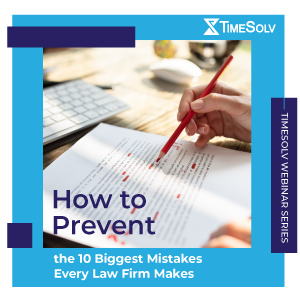There are times when even the most seasoned attorney has trouble settling on a course of action. When you make a decision that works out, it might open doors to exciting new possibilities. If things don’t go as planned, though, your firm’s reputation and profits could end up in jeopardy.
Despite the best intentions, many attorneys fall prey to some common mistakes. From setting unprofitable prices to missing out on opportunities to boost productivity, even simple oversights can slow down your firm’s growth—but they don’t have to.
Armed with the knowledge in this two-part series, you can avoid them all and keep your firm on track to achieve this year’s objectives.
5 more mistakes attorneys make (and how to avoid them)
When you know more, you can make better decisions. Don’t let these simple mistakes hinder your progress as you set and work toward fresh goals in the new year.
Download TimeSolv’s free guide: Biggest Mistakes Every Law Firm Makes at the Beginning of the Year
Biggest Mistakes Every Law Firm Makes at the Beginning of the Year
Did you know that spending more time working doesn’t automatically mean your firm will see a higher profit? In fact, all too often, the opposite is true.
1. Not setting personal and business goals
When your inner compass is clear, it’s easier to set and reach goals—in your career and in your personal life. By contrast, if you don’t know why you’re working so hard, you won’t be driven to keep doing it. In this way, defining success for yourself is extremely useful.
Try setting goals that are specific, measurable, achievable, relevant, and time-bound (SMART). These goals create a point of reference to help you track and evaluate your progress—and celebrate your wins.
2. Ignoring financial warning signs
TimeSolv generates more than 30 different automated reports to help you monitor your law firm’s financial health. Keep a close eye on your firm’s financial data, and take action if you see any of the following red flags:
- Persistently low-profit margin
- Rising accounts receivable (AR)
- A collections rate of less than 90% of the amount billed
- Payables that exceed your liquid assets
- Poor utilization rates among attorneys
- Unbalanced books
When any of these issues arise, it’s time for damage control. Reassess contributing factors such as workload, overhead expenses, and rates to help right the ship.
Pro-tip: these reports won’t have much impact if you don’t read them. Make an appointment with yourself each month to review your financial reports and follow up with any problem areas.
3. Budgeting on the fly
Reactive budgeting is a method of creating a budget that considers how well your company did financially in the past. This can limit your understanding of your firm’s finances because it doesn’t account for future opportunities or challenges.
Reactive budgeting also limits your potential for growth. Without considering all of the factors, putting money toward your long-term goals or marketing efforts can feel risky.
We recommend making decisions based on how things are currently going rather than your company’s financial history. Start by comparing how much your payables and your receivables have grown in percentage terms. Has one increased more quickly than the other? If so, consider raising your fees.
4. Assuming things about clients
The “innocent until proven guilty” approach isn’t ideal for new client selection. Never assume that potential clients can afford your fee structure, will actually read your representation agreement or will be content with how you choose to represent them.
Instead, ask questions:
- Are there any details you feel I should be aware of that you haven’t yet shared with me?
- Have you considered every outcome that could occur in this case, including the possibility that you might lose?
- Have you discussed your case with anyone else, such as a relative or another attorney?
- I’ll be happy to help you with any questions you have about the agreement to represent someone or the terms and conditions of payment. Did you have a chance to read those?
This practice doesn’t just apply to evaluating new clients. As you move forward with representing a client, don’t assume that you know what’s on their mind. Rather, make it a habit to regularly check in with them about their legal matters and how they’re feeling about the progress.
5. Undervaluing your work
As an attorney, your livelihood depends on pricing your legal services effectively—so don’t sell yourself short. Underpricing can be detrimental to your finances, but it may also give the impression to potential clients that your services are inferior to those provided by more expensive law firms.
To get a better idea of what you should be charging, set detailed matter budgets. These budgets help you understand how much work is really going into a case. With this information, you can establish fair-but-profitable rates and fee structures for your work.
Escape these pitfalls and achieve your goals with TimeSolv
Are you prepared to meet your firm’s financial goals in the year ahead? Let TimeSolv help you start working toward them with confidence.
Watch our free webinar on “10 Biggest Mistakes Every Law Firm Makes“ to learn more about how to prevent these errors.
Ready to dive right in? Start your free trial of TimeSolv now.



















